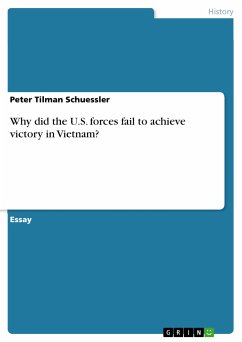Essay from the year 2002 in the subject History of Germany - Postwar Period, Cold War, grade: A, University of St Andrews (Department of Modern History), course: America and Vietnam, language: English, abstract: The discussion of this question starts with the definition of "victory". Surprisingly John Kennedy perceived the definition of the victory as difficult when he mentioned: "how can we tell if we´re winning?" (Herring,1981,p.606). The possible range of victories stretches from setting an end to guerrilla attacks to a complete non-communist Vietnam. The original aim of the U.S. government was most plausibly a situation in which North Vietnam was no threat any more to the South, and the "Communist danger" was banned. Due to various reasons it was impossible to reach that goal. I will show that it was not only the guerrilla warfare that defeated the U.S. Army, it was this special type of insurgency war in this special region under these special circumstances that made this war unwinnable only with military means. If the American generals would have made different decisions they also would have been proven wrong. The war could not end in a victory for the U.S. because there were plenty of constraints which could not be solved in either one way or another. In this context information and trust play an important role. The United States was used to fighting wars that took place in distant regions they were not familiar with before. The difference with this war was that knowledge about this conflict and this land was important. One plausible possibility to gain this information would have been a "combined command" between American and South Vietnam forces as general Westmoreland sought (Herring,1990,p.6). But this was not possible because "the South Vietnamese resisted such an arrangement [...] perceiving it as a form of neo-colonialism" (ibid.) and the U.S. did not trust the ARVN (Army of the Republic of Vietnam) fearing that they could be infiltrated by communists. It is understandable that the JCS (Joint Chiefs of Staff) were afraid of spies within the army of their ally as the "cells" of the North Vietnamese were practising for subversion and sabotage (Thompson,1969,p.32-33). The American leaders on the other hand enforced Saigon to organise its divisions the same as the U.S. ones to be able to "receive [...] logistical support" (Tran Van Don,1987,p.149). Consequently the Southern troops again lost something of their own structure and self confidence. So there did not exist an alliance strategy the Americans could join in, and their strategy was not suitable for the country.
Bitte wählen Sie Ihr Anliegen aus.
Rechnungen
Retourenschein anfordern
Bestellstatus
Storno









